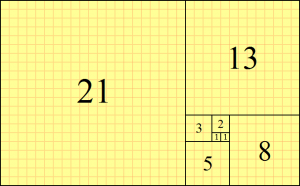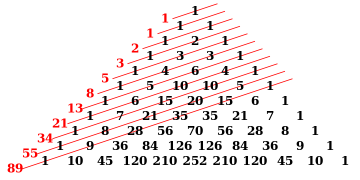Fibonacci numbers: Difference between revisions
No edit summary |
No edit summary |
||
| Line 16: | Line 16: | ||
==Mathematics== | ==Mathematics== | ||
The ratio <math> \frac {F_n}{F_{n+1}} \ </math> approaches the golden ratio as <math>n</math> approaches infinity. | The ratio <math> \frac {F_n}{F_{n+1}} \ </math> approaches the golden ratio as <math>n</math> approaches infinity. | ||
[[File:PascalTriangleFibanacci.png|thumb|right|360px|The Fibonacci numbers are the sums of the "shallow" diagonals (shown in red) of | [[File:PascalTriangleFibanacci.png|thumb|right|360px|The Fibonacci numbers are the sums of the "shallow" diagonals (shown in red) of Pascal's triangle.]] | ||
The Fibonacci numbers occur in the sums of "shallow" diagonals in Pascal's triangle. | The Fibonacci numbers occur in the sums of "shallow" diagonals in Pascal's triangle. | ||
:<math>F_n = \sum_{k=0}^{\left\lfloor\frac{n-1}{2}\right\rfloor} \binom{n-k-1}{k}</math> | :<math>F_n = \sum_{k=0}^{\left\lfloor\frac{n-1}{2}\right\rfloor} \binom{n-k-1}{k}</math> | ||
Latest revision as of 16:49, 19 February 2023
In mathematics, the Fibonacci numbers, commonly denoted [math]\displaystyle{ F_n }[/math], form a sequence, called the Fibonacci sequence, such that each number is the sum of the two preceding ones, starting from 0 and 1. That is,
- [math]\displaystyle{ F_0=0,\quad F_1= 1, }[/math]
and
- [math]\displaystyle{ F_n=F_{n-1} + F_{n-2}, }[/math]
for [math]\displaystyle{ n \gt 1 }[/math].
The beginning of the sequence is thus:
- [math]\displaystyle{ 0,\;1,\;1,\;2,\;3,\;5,\;8,\;13,\;21,\;34,\;55,\;89,\;144,\; \ldots }[/math]
Fibonacci numbers are named after Italian mathematician Leonardo of Pisa, later known as Fibonacci. In his 1202 book Liber Abaci, Fibonacci introduced the sequence to Western European mathematics, although the sequence had been described earlier in Indian mathematics as early as 200 BC in work by Pingala on enumerating possible patterns of Sanskrit poetry formed from syllables of two lengths.
Mathematics[edit]
The ratio [math]\displaystyle{ \frac {F_n}{F_{n+1}} \ }[/math] approaches the golden ratio as [math]\displaystyle{ n }[/math] approaches infinity.
The Fibonacci numbers occur in the sums of "shallow" diagonals in Pascal's triangle.
- [math]\displaystyle{ F_n = \sum_{k=0}^{\left\lfloor\frac{n-1}{2}\right\rfloor} \binom{n-k-1}{k} }[/math]
Counting the number of ways of writing a given number [math]\displaystyle{ n }[/math] as an ordered sum of 1s and 2s (called compositions); there are [math]\displaystyle{ F_{n+1} }[/math] ways to do this. For example, if [math]\displaystyle{ n = 5 }[/math], then [math]\displaystyle{ F_{n+1} = F_{6} = 8 }[/math] counts the eight compositions summing to 5:
[math]\displaystyle{ 1+1+1+1+1 = 1+1+1+2 = 1+1+2+1 = 1+2+1+1 = 2+1+1+1 = 2+2+1 = 2+1+2 = 1+2+2 }[/math]


